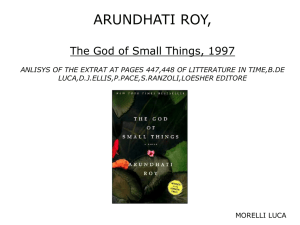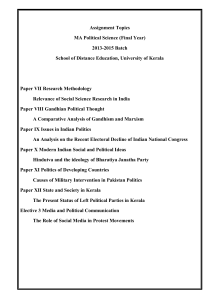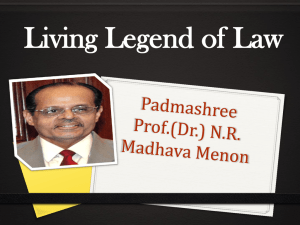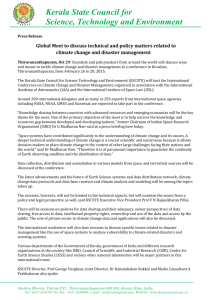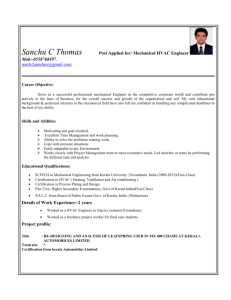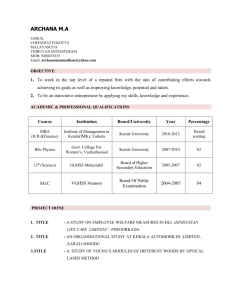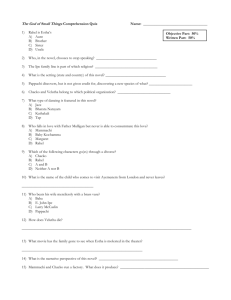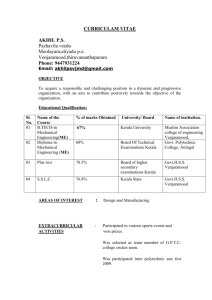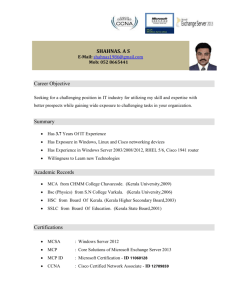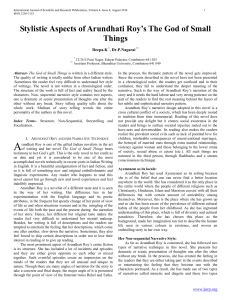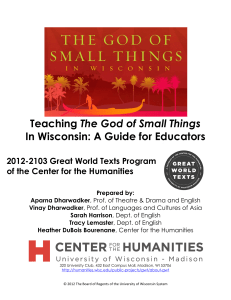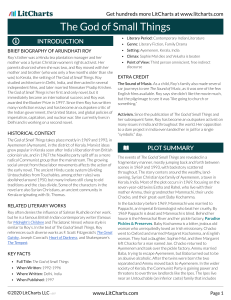Arundhati Roy-
advertisement
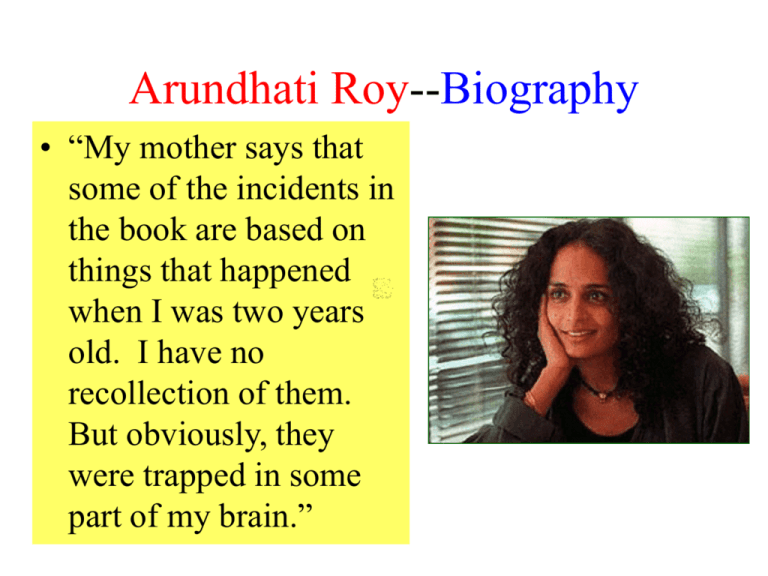
Arundhati Roy--Biography • “My mother says that some of the incidents in the book are based on things that happened when I was two years old. I have no recollection of them. But obviously, they were trapped in some part of my brain.” Arundhati Roy The God of Small Things Pinchia Feng NCTU Arundhati Roy-- childhood • born as Suzanna Arundhati Roy on 11/24/1961 • mother--Mary Roy (Christian)--a wellknown social activist, ran an informal school (Corpus Chrisiti ) • father (a Bengali Hindu tea planter) • uncle--George Issac (owned the Palat Pickles--the slogan: “Emperor in the realm of taste”) Arundhati Roy--childhood • feeling of insecurity because of the broken marriage--“on the edge of the community” (GSM p.60) • “When I think back on all the things I have done I think from a very early age, I was determined to negotiate with the world on my own. There were no parents, no uncles, no aunts; I was completely responsible for myself." Adult Life and Career • left home at 16 and lived in a squatter’s colony in Delhi • The Delhi School of Architecture • marriage (Gerard Da Cunha)--divorced after 4 years • a role in Massey Saab • The Banyan Tree--TV series • screenplay--In Which Annie Gives It Those Ones /Electric Moon • a critique of Bandit Queen Kerala and the Meenachil river Influence of Kerala • “A lot of the atmosphere of A God of Small Things is based on my experience of what it was like to grow up in Kerala. Most interestingly, it was the only place in the world where religions coincide, there is Christianity, Hinduism, Marxism and Islam and they all live together and rub each other down. When I grew up it was the Marxism that was very strong, it was like the revolution was coming the next week…. To me, I couldn’t think of a better location for a book about human beings.” The Rural Environment • “I think the kind of landscape that you grew up in, it lives in you. I don’t think it’s true of people who’ve grown up in cities so much, you may love building but I don’t think you can love it in the way that you love a tree or a river or the colour of the earth, it’s a different kind of love. I’m not a very well read person but I don’t imagine that that kind of gut love for the earth can be replaced by the open landscape.” The God of Small Things • Completed in May 1996 • published in 4/4/1997 by Random House • the Booker Price--Oct. 1997 (India’s 50th anniversary of independence)--the first non-expatriate Indian author and the first Indian woman to win the price Arundhati on Writing the Novel • inspiration--“the image of this sky blue Plymouth stuck at the railroad crossing with the twins inside and this Marxist procession raging around it” • “so much of fiction is a way of seeing, of making sense of the world…and you need a key of how to begin to do that. This was just a key. For me (the novel) was five years of almost unchanging and mutating, and growing a new skin. It’s almost like a part of me.” Biology and Transgression • “I have to say that my book is not about history but biology and transgression. And, in fact is that YOU CAN NEVER UNDERSTAND THE NATURE OF BRUTALITY UNTIL YOU SEE WHAT HAS BEEN LOVED BEING SMASHED. And the book deals with both things--it deals with our ability to be brutal as well as our ability to be so deeply intimate and so deeply loving.” The Title • “To me the god of small things is the inversion of God. God’s a big thing and God’s in control. The god of small things…whether it’s the way the children see things or whether it’s the insect life in the book, or the fish or the stars--there is a not accepting of what we think of as adult boundaries. This small activity that goes on is the under life of the book, All sorts of boundaries are transgressed upon….” • It’s a story that examines things very closely but also from a very, very distant point, almost from geological time and you look at it and see a pattern there. A pattern…of how in these small events and in these small lives the world intrudes. And because of this, because of people being unprotected…the world and the social machine intrudes into the smallest, deepest core of their being and changes their life.”--a last minute title Characters • The Ipe family Papachi (Benaan John)--Mammachi (Shoshamma) Margaret--Checko Ammu (1942-73)--Baba Sophie Mol Esthappen Yako (Estha) Rachel Baby Kochamma (Navomi Ipe) • the Untouchables: Vellya Paapen Velutha Paapen • Comrade K. N. M. Pillai Language and Structure • “Repetition I love, and used because it made me feel safe. Repeated words and phrases have rocking feeling, like a lullaby. They help take away the shock of the plot.” • “...for me the book is not about what happened but about how what happened affected people.” • “in some way the structure of the book ambushes the story…. In the first chapter I more or less tell you the story, but the novel ends in the middle of the story….”--p.32 “Suddenly they become the bleached bones of a story.” Syrian Christian Community • less than 5% of Indian’s population • more than 20%-1/3 in Kerala are Christians • the Syrian Church is one of the oldest branches of Christianity-came to India with St. Thomas in 52 CE. Controversy • England--“derivative”--about India • India--communist critique from E M S Namboodiripad--“Anybody who attacks Communists anywhere in the world will be welcomed by the captains of the industry of bourgeois literature in the world.” + “sexual anarchy • + obscenity case--Sabu Thomas-- affront Indian tradition, culture, and morality; “excites sexual desires and lascivious thoughts”; hurts the Syrian Christian community Women in Kerala • Relative freedom for women in Kerala • assertive, energetic, courageous women • instances of patriarchal oppression • How are the women being characterized in the novel? (Mammachi, Baby Kochamma, Ammu, Rahel) Timeline • 1969--communist march (p.62-69); Sophie Mol’s visit, death, and funeral; Ammu and Velutha; Velutha’s death • 1973--Ammu’s death (31), p.5 “a viable die-able age” • 1992--the narrative present--Estha (“the quietness,” “re-Returned”); Rahel (divorced, back for the States); Baby Kochamma (satellite TV and diary) Children--Two-Egg Twins • P.4-5 “In those early amorphous years when memory had only just begun, when life was full of Beginnings and no Ends, and everything was Forever, Esthappen and Rahel thought of themselves together as Me, and separately, as We or Us. As though they were a rare breed of Siamese twins, physically separate, but with joint identities.”--“…now she thinks of Estha and Rahel as Them, because, separately, the two of them are no longer what They were or thought They’d be.”--p.81-82 The Love Laws/ Caste System • p.33 “That it really began in the days when the Love Laws were made. The laws that lay down who should be loved, and how. And How much.” • caste is “the defining consideration in all Indian politics, (and) in all Indian marriages, (but) the lines are blurring. India exists in several centuries simultaneously.” (GMS p.71 on the Untouchables) Chapter 2 (1) • time: 12/1969 (the day before Sophie Mol’s arrival) • place: Ayemenem-----Cochin • pop culture: The Sound of Music (1965); Elvis puff, Love-in-Tokyo p.37 • language: p.37 Malayalam vs English (“Pre NUN sea ayshun”--example of small transgression)/ “cuff-link” p.50 • p.38 “the Terror”--p.74 Chapter 2 (2) • Ammu--“life had been lived” p.38-44 “Unsafe Edge” (p.44) • “The fate of the wretched man-less woman.” (p. 44-5) • Paradise Pickles & Preserves • Mammachi’s pickles (and violin) vs Pappachi’s moth (p.48)--colonized/ power and knowledge • other (post)colonial issues: CCP and Anglophile p.50-51 History • “The History House” (p.51-54) Chacko’s--“an old house at night.” (p.51) children’s--Kari-Saipu’s house --in 1990s: “Toy Histories for rich tourists to play in. Like the sheaves of rice in Joseph’s dream, like a press of eager natives petitioning an English magistrate, the old houses had been arranged around the History House in attitudes of deference. ‘Heritage,’ the hotel was called.” (p.120) • geological time: ‘the Earth woman” (p.52) • Kurtz and the Heart of Darkness Symbolic Language--questions • • • • • Rahel’s watch (p.37) frogs (p.42) Chacko--airplanes and pickle baron (p.55-56) reading backwards--”Satan in their eyes” (p.58) ambulance (Sacred Heart Hospital) and wedding party (p.58) • Murlidharan’s keys and “cupboards, cluttered with secret pleasure” (p.61) Marxism in Kerala • “The first Communist government in the world was elected in Kerala in 1957, and from then on it became a big power to contend with. I think in '67 the government returned to power after having been dismissed by Nehru, and so in '69 it was at its peak. And it was as if revolution was really just around the corner.” + (GMS p.64-65)
